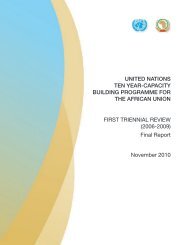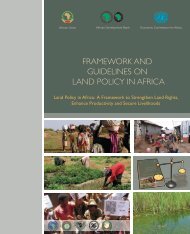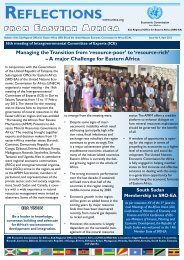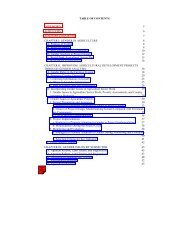A Decade of NEPAD - Economic Commission for Africa - uneca
A Decade of NEPAD - Economic Commission for Africa - uneca
A Decade of NEPAD - Economic Commission for Africa - uneca
You also want an ePaper? Increase the reach of your titles
YUMPU automatically turns print PDFs into web optimized ePapers that Google loves.
72 A <strong>Decade</strong> <strong>of</strong> <strong>NEPAD</strong>: Deepening <strong>Africa</strong>n Private Sector and Civil Society Ownership and Partnership<br />
legitimacy to speak out on issues and whose views<br />
should be incorporated into stakeholder processes. As<br />
arguably each <strong>of</strong> these CSO constituents has a role to<br />
play in the continent’s development, there is a need to<br />
establish more opportunities <strong>for</strong> discussion about how<br />
sometimes divergent views can be harmonized or lead<br />
to a collectively held compromise view point.<br />
ӹ Need to Improve Communications Strategy and Capacity<br />
– Consistently from the earliest meetings related<br />
to <strong>NEPAD</strong> and engagement with CSO community, to<br />
more recent discussions in 2009, many have lamented<br />
that the <strong>NEPAD</strong> message has been muffled and muddled<br />
(if it gets out at all) when disseminated to <strong>Africa</strong>’s<br />
citizens. The average <strong>Africa</strong>n, if aware <strong>of</strong> <strong>NEPAD</strong>, feels<br />
very little ownership <strong>of</strong> the initiative nor an inspiration<br />
to participate in its implementation – in large part<br />
because the correlation between direct improvement in<br />
his or her standard <strong>of</strong> living and <strong>NEPAD</strong>’s programmes<br />
has not been effectively made. Thus, <strong>NEPAD</strong>’s architects<br />
and promoters must work to increase transparency,<br />
accountability and promote a citizen-focus in all <strong>of</strong> the<br />
initiative’s programmes. The <strong>Africa</strong>n print and broadcast<br />
Strengths<br />
• Development <strong>of</strong> ECOSOCC and CCP-AU establishes vehicles<br />
through which <strong>Africa</strong>n CSOs can work to learn more about the<br />
<strong>NEPAD</strong> processes<br />
• The AU/<strong>NEPAD</strong> integration process should bring additional CSO<br />
interest and skill sets to bear within the <strong>NEPAD</strong> process<br />
• The UN’s OSSA has established a web based database <strong>of</strong> more<br />
than 2000 <strong>Africa</strong>n CSOs by sector that can be accessed by <strong>NEPAD</strong><br />
programme coordinators to solicit input in the various progrannes<br />
• Growing cadre <strong>of</strong> competent, technically capable and nationally,<br />
regionally and internationally connected <strong>Africa</strong> CSOs<br />
• Expanding number <strong>of</strong> pan-<strong>Africa</strong>n technical CSO networks <strong>for</strong><br />
<strong>NEPAD</strong> to engage with<br />
Weaknesses<br />
• Lack <strong>of</strong> adequate number <strong>of</strong> national and regional <strong>NEPAD</strong> CSO<br />
focal points cross <strong>Africa</strong><br />
• Capacity constraints among CSOs<br />
• Turf and legitimacy issues that periodically emerge between <strong>Africa</strong>n<br />
CSOs and International CSOs in <strong>Africa</strong><br />
• Existing distrust <strong>of</strong> CSOs that remains in a number <strong>of</strong> <strong>Africa</strong>n<br />
governments<br />
• Lingering scepticism about the aims and interests behind <strong>NEPAD</strong><br />
still held by some in <strong>Africa</strong>n CSO community<br />
• Lack <strong>of</strong> <strong>for</strong>mally incorporated engagement mechanism <strong>for</strong> CSOs<br />
to be involved in all aspects <strong>of</strong> <strong>NEPAD</strong><br />
media have to become more engaged to get out the very<br />
basis aspects <strong>of</strong> <strong>NEPAD</strong> and to report on the successes<br />
and best practices that have come to pass over the past<br />
tenyears.<br />
ӹ Need to Raise the Prominence <strong>of</strong> <strong>NEPAD</strong> as a Policy<br />
and Programme Priority at the National Level Within<br />
Member States – Just as <strong>Africa</strong>n regional integration has<br />
lagged because member states have tended to put national<br />
priorities above regional policy and programmes,<br />
given the strong regional integration and sub-regional<br />
organ and infrastructure development focus <strong>of</strong> <strong>NEPAD</strong>,<br />
unless and until most <strong>Africa</strong>n states make <strong>NEPAD</strong> a<br />
clear national agenda item and priority, adequate space<br />
will not be created <strong>for</strong> interested CSOs to engage locally<br />
in the <strong>NEPAD</strong> processes. As most <strong>Africa</strong>n CSOs function<br />
locally and give voice to local/ national concerns,<br />
the prioritization <strong>of</strong> <strong>NEPAD</strong> at national strategy levels<br />
will definitely enhance CSO focus on <strong>NEPAD</strong> issues.<br />
A SWOT analysis is also instructive in identifying current<br />
engagement factors that impact upon the <strong>Africa</strong>n CSOs<br />
relationship with the <strong>NEPAD</strong> process:<br />
Opportunities<br />
• Diaspora CSOs interested in the work <strong>of</strong> the AU will also be useful<br />
resources to engage regarding <strong>NEPAD</strong><br />
• APRM still relatively young initiative with much to be dome in<br />
almost all <strong>Africa</strong>n countries<br />
• New revised AAP delineates 2010-2015 project focus- all <strong>of</strong> which<br />
hold opportunities <strong>for</strong> CSO involvement<br />
• Growing number <strong>of</strong> donor funded support programmes that can<br />
aid CSOs – ProInvest, ICF<br />
• The 2009-2010 <strong>NEPAD</strong> Business Plan explicitly calls on the Secretariat<br />
to step up ef<strong>for</strong>ts to engage with CSOs<br />
• Engagement with the various sectoral clusters developing – UN<br />
RCM, <strong>Africa</strong>-EU Partnership Forum<br />
Threats<br />
• Global economic crisis impedes financial flows to CSO support<br />
programmes<br />
• <strong>Africa</strong>n governments determining not to create increased spaces<br />
within which CSOs can engage<br />
• Any hiccups or delays in the AU/ <strong>NEPAD</strong> integration process<br />
• <strong>NEPAD</strong> inability/ refusal to support capacity development within<br />
CSO community and within the REC community (the latter need<br />
CSO focal points)<br />
• Competition with international CSOs whose agendas are not<br />
aligned with those <strong>of</strong> <strong>Africa</strong>n CSOs but who have more resources<br />
to work with and with which to be heard and to use to engage<br />
with <strong>NEPAD</strong>







